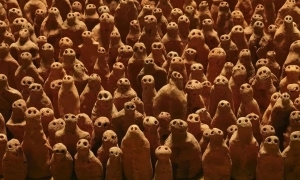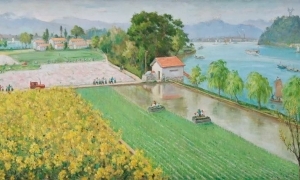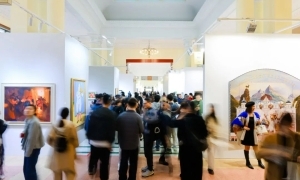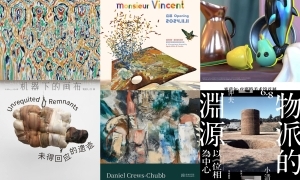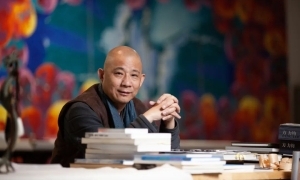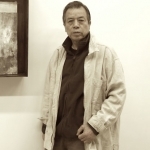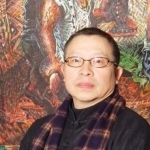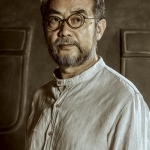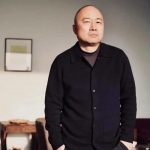王林
作为一位执着的艺术家,傅榆翔喜欢带有梦魇感觉的图象,我比较喜欢的作品是他的《树妖》系列。在这些作品中,他找到了一种有意味的形式,把树枝、树根的造型和人体特别是女人体结合起来,让人觉得新鲜而富有诗意。这些图象的来源和重庆的黄桷树多少有些关系。黄桷树作为重庆的市树,在岩壁暴露根系、盘根错节、枝繁叶茂,有非同寻常形态特征。傅榆翔利用有机体的相似性,创造出自己的绘画形式,可见画家平时用心良苦。
前言·于川美桃花山2004年5月15日
As a dedicated artist, Fu Yuxiang tends to produce those images that arouse a nightmare-like sensation, among which I personally like his Wood Sprite series. He has been able to find a form of meaning among his works by refreshingly and poetically combining the shapes of tree branches and roots with the form of female bodies. The source of these images more or less has a bearing with Ficus virens in Chongqing, which as the city tree of the municipality usually exposes its complicatedly twisted roots with intercrossing branches on the verge of cliffs, thus creating unusual morphological features. Having perceived the similarity of organisms, Fu Yuxiang successfully originated his own form of painting, which also reveals the artist’s commitment to his artistic creation.
From Wang Lin’s Preface,
written at Taohua Hill, Sichuan Academy of Fine Arts,
on May 15th, 2004
叶永青
傅榆翔的画有着无尽的辽阔的苍茫感,万物沉寂而各得其所,那是对生命自由的渴望与追求,他以艺术肯定对人间的“怜悯”,把生命价值置于艺术价值之上,换言之,他的艺术“价值”是在传达对生命的态度与对人间的期许,亦即人洒脱飘逸的,生命是自由自在的,但是在飘逸、自由间,仍旧带着由焦虑与不安转化而来的无奈和感伤,而这些矛盾的因素现在已化为“凄迷的诗质”,隐藏在他浪漫抒情的艺术风格中。
凄迷的诗质·2004年5月12日夜于山城桃花山
With a vast expanse of boundless infinity, Fu Yuxiang’s paintings reveal a quiet stillness of the creatures in their own proper place, reflecting an aspiration and pursuit of ultimate freedom. The artist with his works of art shows his “pity” on the world of mortals and places the value of life above that of the art. In another word, the artistic value is embodied by the delivery of artist’s attitude towards life and his expectation on the world of mortals, namely, the concept that humans are elegantly free and life is untrammeled. But in between there is still presence of palpable feelings of resignation and sorrow resulted from anxieties and worries. However, such contradictory factors have now melted into “poetic melancholy” hidden an artistic style of lyric romance.
From Ye Yongqing’s Poetic Melancholy,
written on Peach Blossom Mountain,
李小山
同时我觉得,傅榆翔在安排阶段性任务时体现出来的总体观显得相当成熟,这种成熟表现在脚踏实地的自我超越上,在这一过程中,没有所谓的进步和退步,它只是有意识并且有见识地推动每一次超越。或许,傅榆翔还有更大程度的空间,那样的话,他每一个阶段的成果都是有力的见证。
傅榆翔曾使了很大的劲研究造型、色彩、用笔、肌理,做的工作已足够了,从他的画作里我们清晰地发觉了他这方面的全部优点,丰富性和复杂性只在某种阶段具有魄力,而寻找纯粹的形式和表达,则是衡量傅榆翔下一步创作尺度,缺少这个,它的工作似乎才完成了一半,所以我说,他应该建一座自己的桥,渡过去,完成全部过程。
建一座自己的桥·2004年9月3日于南京
Meanwhile, as I see it, Fu Yuxiang has demonstrated a mature capability of making an overall planning for periodic tasks. This type of maturity is manifested in a down-to-earth self-transcendence, during which process there is no such thing as so-called progress or retrogression but only a transcendence motivated by a well-informed self-consciousness. Perhaps there’s even more space for Fu Yuxiang’s artistic creation and in that case it will be witnessed by success of each stage.
Fu Yuxiang once made enhanced efforts and contributed sufficient work to the study of modeling, coloring, brushing and texture. From his works we can find a clear clue to all his strong points in this field. As richness and complexity are expression of vigorousness only at certain stage, the search of pure form and expression shall be regarded as the measurement of Fu Yuxiang’s creation at next stage. With this being absent, his work only seems half-done. Therefore, my comment would be he builds a bridge of his own and then cross over to complete the whole process.
From Li Xiaoshan’s Building A Bridge of His Own,
written in Nanjing,
on September 3rd, 2004
丁方
傅榆翔的画带有一种鲜明的文化地理的烙印,显示了深阔的川蜀大地和苍茫的群山对他心灵的影响;那些具有自然旷野气息的元素弥漫在它的画中,并构成了傅榆翔的画面的基本调性。实际上,描绘表现自然大地的画家大有人在,但傅榆翔的画面仍然令我惊异;因为它对蕴藏树木自然中的原始生命力感受是如此强烈,对弥漫在大地山川中的诗意之体悟是如此浓郁,使我闻到了一种久违的气息。
甘愿沉潜·2005年5月于北京
With a strong, vivid stamp of cultural geogrophy, Fu Yuxiang’s paintings demonstrate an influence of the vast land and rolling mountains in Sichuan on his soul; those elements with a natural touch of open fields present all over his works have constituted the basic tone of Fu Yuxiang’s own style. In fact, there’s a wide variety of painters who focus on the depiction of the great nature but the images created by Fu Yuxiang still come as a surprise to me because his feeling about life in its most primitive vitality contained in those trees and the nature is so intense and his perception of the poetic essence permeating through the vast expense of land and mountains is so overwhelming that I can even smell a long-lost connection.
From Ding Fang’s Chosen Quietness,
written in Beijing,
in May, 2005
宋智林
《树妖》泛化地表现出人的一种生存状态,是实体生命与虚象运势的表述,但更准确地说,它是“喜纯、诚挚与自由”的传达。如若真实地达到这个状态,人就必须按照“生命的本来面目”去生活。在禅宗解释中“生命的本来面目”指一种不经意识浸染的,与无意识宇宙相通的状态。也许,这正是傅榆翔先生欲借《树妖》给人的一种深刻的思想启示。
人文之元,肇自太极·2003年于北京
Wood Sprite expresses in general a state of existence for human beings and represents a combination of physical life and a virtual luck tendency. But more precisely, it conveys the concept of “purity, sincerity and freedom”. To truthfully reach this status, mankind will have to live as “the way it is”. According to the interpretation of Zen Buddhism, “the way it is” refers to a state in connection with the cosmos of unconsciousness, which is not interfered by the consciousness. This is perhaps the profound enlightenment that Mr. Fu Yuxiang wants to pass on to the viewers by his works of Wood Sprite.
From Song Zhilin’s Humanity Begins with Taiji,
written in Beijing,
in 2003
玛格莉娜(意大利)
傅榆翔先生的杰作缘于观察、理解和融入自然和社会氛围,他见证了新艺术感性的发展。感谢人类的共同语言:艺术,傅榆翔先生,调和了不同文明的冲突,并成功的进行了不同文化价值的对话。
傅先生,一阵来自中国的艺术清风
依存身心的清风·2004年5月13日于云南
The master pieces of Mr. Fu Yuxiang, a witness of the perceptible development of new art, are based on a shrewd observation, profound perception and a natural incorporation into the nature and social atmosphere. Thanks to art, the common language of mankind, Mr. Fu Yuxiang has brought different cultural conflicts into harmony and successfully conducted dialogues between different cultural values.
Mr. Fu, a breath of fresh air from Chinese art.
From Margarita(Italy)’s A Breath of Fresh Air from Mind and Soul
written in Yunnan
on May 13th, 2004
【编辑:霍春常】






